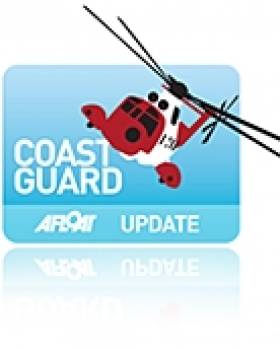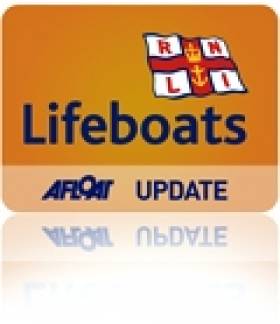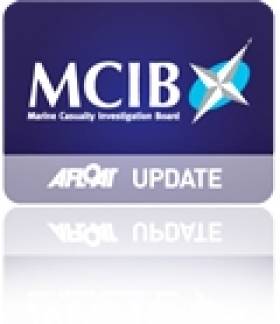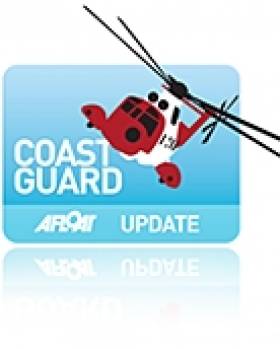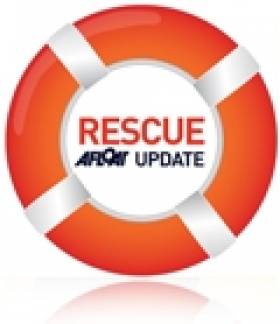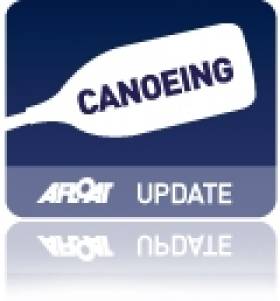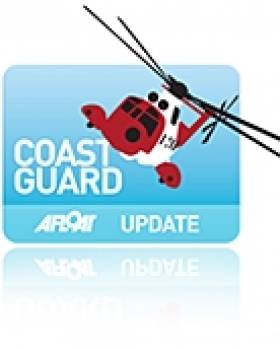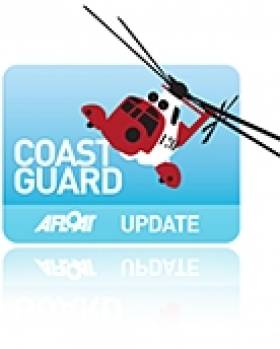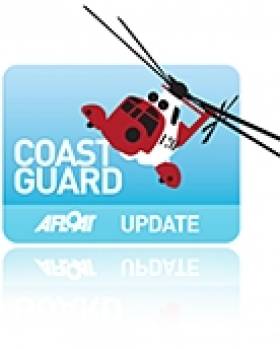Displaying items by tag: Rescue
Walkers Rescued at West Kirby
#COASTGUARD – Two walkers have been rescued from the water at West Kirby on the River Dee estuary after a three hour ordeal, lost in fog.
Liverpool Coastguard received a 999 call from the pair at 5.10pm reporting that they had set off for a dog walk out on the sands near Hilbre Island but thick fog had come in and they became disorientated and lost. The tide was coming in and it was dark at 5pm so combined with foggy conditions the visibility was very poor.
Liverpool Coastguard initiated a search of the area involving Hoylake and Newbrighton Coastguard rescue teams, West Kirby RNLI inshore lifeboat and the Hoylake lifeboat tractor. The rescue helicopter from RAF Valley also began a search of the area but foggy conditions prevented them continuing.
The Merseyside Coastguard Sector Manager was able to keep talking with them by mobile phone but visibility was less than 20 metres and the pair reported that they were up to their waists in water with the incoming tide. At 8pm the shore crew of the West Kirby RNLI lifeboat heard them shouting and the inshore lifeboat was guided in to recover the two males and their dog from the water and transfer them to a waiting ambulance. The pair are a father and son and were reported to have been suffering from severe hypothermia.
Liverpool Coastguard Watch Manager Graham Parr says,
"These large stretches of sand and channels can be treacherous so always check weather and tides before you set off and ensure you leave plenty of time to get back to shore before darkness. Unfortunately these walkers were caught out by thick fog today."
Howth Lifeboat Crew Aid Fishing Vessel
#RESCUE – Lifeboat crew with Howth RNLI spent over ten hours on Saturday (4 February 2012) assisting a 17 metre fishing tralwer, with seven crew onboard, 36 miles north east of Howth, which was rapidly taking on water.
Howth RNLI were requested to launch their all weather lifeboat to the fishing vessel at 1.08 pm on Saturday afternoon and it would be nearly ten and a half hours later when they returned to the harbour with the casualty vessel under tow.
The Irish Coast Helicopter were also on scene to help the stricken vessel and a winchman delivered a salvage pump onboard to help the crew try and staunch the water. With the lifeboat on scene the Coast Guard helcopter returned to base and the lifeboat crew worked quickly to establish a tow in difficult conditions. Weather was force six with a strong southerly wind.
Keeping the casualty vessel under tow in bad conditions proved challenging and the rope parted a couple of times. Sixteen miles north east of Howth the fishing crew reported that the water coming into the vessel was increasing and the tow was stopped. A lifeboat crewmember was transferred onto the fishing trawler and a new salvage pump was put onboard. The source of the leak was identified and action taken to stem the flow of water. The lifeboat once again undertook the tow and eventually arrived into Howth harbour at 10.25pm. All crew onboard the fishing vessel were unhurt.
Commenting on the callout Howth RNLI crewmember Dave Howard said, " This was a long callout for our all weather lifeboat crew. Condtions were not great offshore and going from the lifeboat onto the casualty vessel in a two to three metre swell was very challenging. However when a fishing vessel reports taking on water, it is vital to make sure that the crew are safe and that the tow does not part. We are relieved that all crew got home safe."
#MCIB - The decision to set out in poor weather, coupled with limited safety instruction, led to the tragic death of a Romanian angler on Lough Mask last summer, according to a report by the Marine Casualty Investigation Board (MCIB).
Mircea Ungur drowned after the angling boat he was in capsized in choppy waters brought on by squalling Force 8 winds on the afternoon of 8 May 2011.
Ungur had a tracheostomy tube in his throat resulting from a previous battle against throat cancer, and drowned after taking in water through this tube, the MCIB concluded. It was also found that most of his companions and the guide knew nothing about the tube.
At the time of the incident, Ungur had been on an angling holiday in Co Mayo with five colleagues accompanied by a fishing guide. On the morning of 8 May the group set out from Cappaduff in Tourmakeady on two boats, following a brief discussion about fishing and safe departure from the pier.
Winds were already reaching Force 4-6 when the group departed and sought a sheltered area of the lough to fish. After lunch winds had picked up to Force 8 and the guide signalled for a return to Tourmakeady.
At around 1.5km from the pier at Cappaduff, a wave swamped the leading boat that contained Ungur, a companion and the guide. All three on board, who were wearing buoyancy aids, went into the water.
Ungur was the first taken on board the other boat after some 10 minutes in the water. He was not moving or communicating with the others, and CPR was not administered until the boat reached the shore 20 minutes later. Ungur was pronouced dead just before 3pm.
The report concluded that the group had departed despite reservations among them about the poor weather, which had been correctly forecast that day. There was also little discussion with the anglers about their level of boating experience, the weather, or any disabilities that would affect their safety on the water.
The MCIB recommended that a full safety briefing should be given to all those hiring angling boats. It also urged the enforcement of safety regulations and certification for recreational water craft.
The full report is available to download as a PDF from the MCIB website HERE.
#RESCUE – Naval divers are searching a sunken Irish registered vessel for three missing people off Glandore harbour Co. Cork this morning. An operation is underway after a distress call was made at 6 am. Six people were on board and five are still missing from the vessel 'Bonhomme' that sank in 11m of water. A distress call was made just before 6am. The trawler is understood to have been making its way home in force 7 to 8 south-easterly winds when the alarm was raised. The Coastguard and a number of lifeboats are involved in the search. One crew man has been taken to hospital.
Duo Rescued from Sinking Fishing Boat in Galway
#RESCUE - BreakingNews.ie reports that two men have been rescued from a sinking fishing boat in Galway Bay this afternoon.
One of the two men on board the vessel alerted rescue services around 2pm after they began taking on water close to Salthill west of the city.
Two other fishing boats aided the duo before the Galway RNLI lifeboat crew boarded the vessel and used a pump to keep it afloat.
The stricken boat has since been towed back to the city docks.
Two Kayakers Washed Ashore
Two kayakers on the Irish Sea were given medical attention this evening after abandoning their kayaks whilst out at sea off Morfa Nefyn and spending three hours in the water trying to make it back to shore.
North Wales Ambulance Control contacted Holyhead Coastguard at 10.06 pm to report that a member of the public had called to inform them that two kayakers had knocked on their door asking if they could come inside to warm up after being in the water, and that they potentially needed medical attention. Holyhead Coastguard sent the Porthdinllaen Coastguard Rescue Team to meet the casualties to find out what had happened and assist in locating their kayaks.
Once on scene, the coastguard rescue team reported back to the Operations Room that the two male kayakers (one aged 23 and one aged 24) had set out from Morfa Nefyn beach at 7pm, had gone out approximately half a mile and then panicked, abandoned the kayaks and been washed ashore. When they finally made it ashore just before 10pm, they knocked on the door of a nearby house to ask for help and an ambulance was called. The coastguard rescue team spoke to the two casualties and the kayaks were recovered.
View Larger Map
Barry Priddis, Holyhead Coastguard Watch Manager said:
"Although this incident contains a catalogue of errors that we would warn against, the fact that these two kayakers were both wearing lifejackets undoubtedly saved their lives tonight. We always advise members of the public not to go out on the water in conditions or distances that are beyond their capability, and if they do find themselves in such a situation, to call the Coastguard and ask for help. Attempting to swim ashore is very dangerous, especially with outside temperatures as they are at the moment and had these two not been wearing lifejackets which kept them afloat we could be looking at a very different outcome."
Go-Ahead for Killybegs Coastguard Station
#COASTGUARD - The Office of Public Works has given the go-ahead to a long-awaited new coastguard station for Killybegs, the Donegal Democrat reports.
The multi-million-euro three-storey station - replacing the current 20-year-old building, which is deemed no longer suitable to demands - will be constructed at the Rough Point and will include a boat house and pollution control centre.
The Irish Coast Guard unit at Killybegs has 25 volunteer members, and also operates as a mountain and cliff rescue service. The unit serves one of Ireland's busiest ports.
The Donegal Democrat has more on the story HERE.
Marine Escapes Cuts in Latest Budget
#BUDGET - Coastguard and lifeboat services, mountain rescue and the Commissioners of Irish Lights will not face any further funding cuts in the latest Budget, according to the Minister for Transport.
The Irish Times reports that, following the reduction of his department's budget, Minister Leo Varakdar stated that substantial cuts have already occurred in the maritime safety sector.
Moreover, he announced an increase in the maritime budget from €70.5 million to €80.3 million, due to provisions for the new Irish Coast Guard helicopter contract.
Earlier this week, Minister for Agriculture, Food and the Marine, Simon Coveney, underlined the importance of the marine sector to Ireland's coastal communities.
As previously reported on Afloat.ie, Minister Coveney announced a round of expenditure estimates on Monday which include increased funding for investment in processing, aquaculture and fishery harbours.
Russian Ambassador Proposes Reward for Swanland Rescuers
#COASTGUARD - Russia's ambassador to Britain has proposed rewarding rescuers involved in the search for missing seamen in the Irish Sea last week following the sinking of the cargo ship Swanland.
As previously reported on Afloat.ie, the cargo vessel - carrying 3,000 tonnes of limestone - went down some 10 miles west of the Lleyn peninsula in north Wales in the early hours of last Sunday.
Two of the eight crew, who were all Russian, were recovered from the sea. A third was found deceased, while the remaining five are still missing.
As many as 11 coastguard rescue teams were involved in the search operation, which also saw an RAF rescue helicopter - piloted by Prince William - lend assistance.
At a meeting with the two rescued sailors in London last Wednesday, Ambassador Alexander Yakovenko commented: “What if we propose [the rescuers] to be rewarded by the Russian side?”
Russian news agency RIA Novosti has more on the story HERE.
Update on Search for Swanland Crew
This morning's search for the five seafarers began at 8.00 am and covered 105 miles of coastline from Holyhead to Aberdovey. Although that search is now complete, coastguards will carry out a short low water search from 3.00 pm until dusk.
Five lifeboats, six helicopters, four coastguard rescue teams, three merchant vessels, an Irish naval patrol vessel and a fixed wing aircraft searched an area of approximately 300 square miles yesterday. However, the only sign of the missing seafarers was their two liferafts, a lifebuoy from the vessel and a survival suit.
Holyhead Coastguard Watch Manager, Ray Carson says:
"Sadly we still have not been able to locate the missing seafarers. We will carry out one final search at low water today."



























